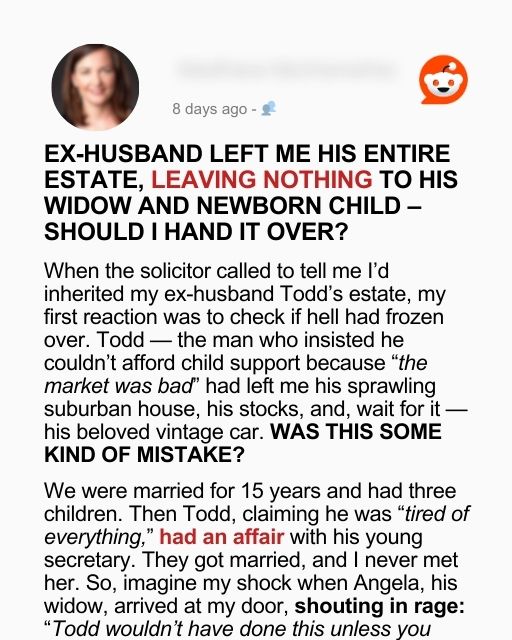When the solicitor called to tell me I’d inherited my ex-husband Todd’s entire estate, my first reaction was to check if hell had frozen over. Todd—the man who once insisted he couldn’t afford child support because “the market was bad”—had left me his sprawling suburban house, his stocks, and, wait for it—his beloved vintage car.
WAS THIS SOME KIND OF MISTAKE?
Todd and I had been married for fifteen years. We built a life together, had three beautiful children, and then, out of nowhere, he claimed he was “tired of everything.” That “everything” turned out to be me and our marriage. He left for Angela, his young secretary, and within months, they were married. I never met her, never wanted to. Our kids, now in their teens, barely had time to adjust before Todd started his brand-new life.
Then, just two years after our divorce was finalized, he died suddenly. A heart attack. He was only forty-eight.
I was still processing the news when Angela showed up at my doorstep.
“You tricked him!” she shouted, her face twisted in fury. “You manipulated him into changing the will!”
I was too stunned to respond. I hadn’t even seen Todd in months, let alone had a chance to manipulate him.
She kept going. “You have to give it back! He has a son now! My son! We need that money!”
Her baby, only a few months old, lay sleeping in the car seat she had set down on my porch. I could hear his soft breathing, completely unaware of the storm his mother was unleashing.
I didn’t know what to say, so I let Angela yell. And when she finally ran out of words, I quietly told her that I had no idea why Todd had done this. But it was in his will.
That was when she threw down the final blow: “If you don’t give it back, I’ll take you to court.”
I closed the door in her face.
The next morning, I met with Todd’s lawyer, who had handled our divorce and, apparently, his final will.
“It’s no mistake,” he assured me. “Todd changed his will three months before he passed. He left everything to you and your children.”
“But why?” I asked.
The lawyer sighed. “I think he regretted what he did. He never stopped loving you, even after the divorce. He told me he felt guilty every day. And… he didn’t entirely trust Angela.”
I let that sink in. The man who abandoned me and our children for a younger woman had been feeling guilty? And now, that younger woman was left with nothing?
A part of me wanted to feel vindicated. After all, Todd had left me and the kids struggling while he played house with his new wife. And now, justice had been served in the most ironic way possible.
But then I thought of Angela’s baby. His baby. My kids’ half-brother.
SHOULD I HAND IT OVER?
Legally, I owed Angela nothing. Morally? That was harder to answer.
I thought about our three children and how, despite Todd’s flaws, he had been their father. Then I thought about the baby who would never get to know him. Did I really want to be the reason he had nothing?
Still, Angela had burst into my home, accusing me of theft. She had never reached out to me with kindness. Never even attempted a conversation before threatening a lawsuit.
That night, I called my eldest son, Michael, into the kitchen. “What do you think?” I asked.
He frowned. “Dad did this on purpose. He wanted us to have it.”
“But what about the baby?”
Michael hesitated. “I feel bad for him… but Angela? She got what she deserved.”
His younger sister, Emily, overheard from the hallway and joined in. “Mom, you should keep it. Think about all the times Dad refused to help us. Now we finally have something.”
I looked at my kids. They had grown up watching Todd choose his new life over them, and they had hardened because of it.
The next day, I called my lawyer.
“I want to set up a trust,” I said. “For the baby.”
I could almost hear his surprise over the phone. “Are you sure?”
“Yes,” I said. “But only for the child. Not a cent goes directly to Angela.”
A week later, I asked Angela to meet me. She showed up, arms crossed, ready for a fight.
“I’m not giving you Todd’s money,” I told her. “But I am setting up a trust for your son. When he turns eighteen, he’ll get a fair share.”
She looked shocked, then skeptical. “And I don’t get anything?”
“No,” I said flatly. “This is for the child. Not you.”
Angela scoffed. “I don’t believe you. You’ll just keep everything.”
I slid the paperwork across the table. “It’s already in motion. The money will be legally locked until he’s eighteen. You can’t touch it.”
She hesitated, then picked up the papers and read them. I watched her face change—first from suspicion to realization. And then, unexpectedly, she started crying.
“You don’t have to do this,” she whispered.
“I know,” I said.
Angela wiped her tears and looked at me, really looked at me for the first time. “I’m sorry. For how I treated you. For everything.”
I nodded, not ready to forgive, but at least willing to move forward.
I kept Todd’s estate, his house, his stocks, and even his vintage car. My children would finally have financial stability, something he had denied them when he was alive.
But I also ensured that his youngest child wouldn’t suffer for Todd’s mistakes.
As I walked out of the meeting, I realized something.
Todd had spent his last months trying to undo his past wrongs. And now, in a way, I had done the same.
Was this the best way to handle things? I will never know, but it didn’t keep me up at night.




